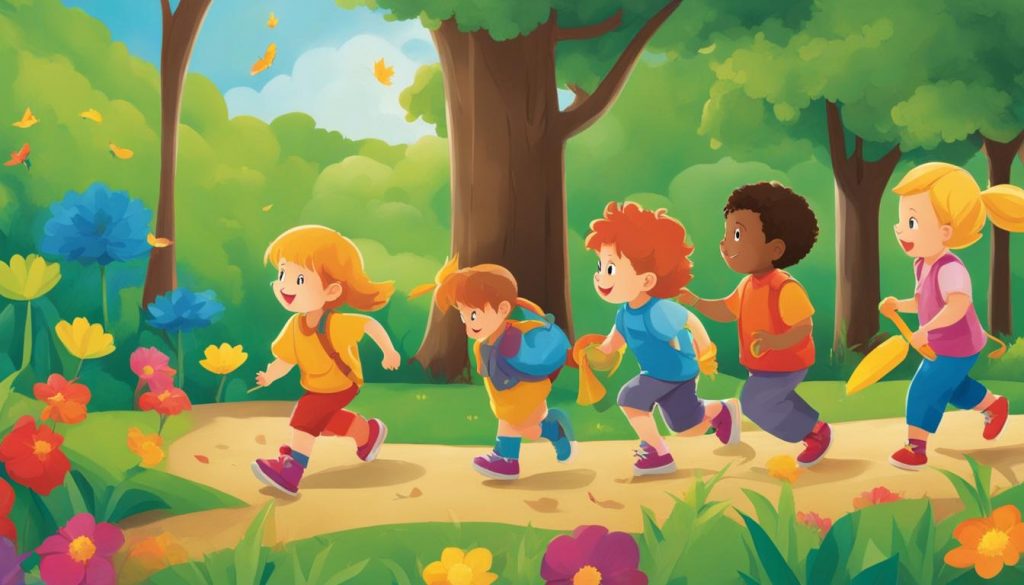Understanding Basics: What is Child Development?
Child development refers to the sequence of physical, language, thought, and emotional changes that occur in a child from birth to adulthood. It encompasses the development of cognition, social interaction and emotional regulation, speech and language, physical skills, and sensory awareness. Child development is influenced by genetic factors, prenatal life events, environmental factors, and learning capacity. It is important to monitor developmental milestones to ensure that children are progressing on track. Early detection and intervention of developmental challenges can minimize their impact on a child’s skill development and confidence.
Key Takeaways
- Child development involves physical, language, thought, and emotional changes that occur from birth to adulthood.
- Cognition, social interaction, emotional regulation, speech and language development, physical skills, and sensory awareness are key aspects of child development.
- Observing developmental milestones is crucial for early detection and intervention of challenges.
- Developmental challenges can arise due to genetic factors, prenatal circumstances, or lack of opportunity.
- A safe and loving home environment, proper nutrition, exercise, and positive parenting practices contribute to healthy development.
Key Aspects of Child Development
Child development covers various aspects that contribute to a child’s growth and overall development. Understanding these key aspects is essential for parents and caregivers to provide optimal support and guidance to children. Let’s explore some of the key aspects of child development:
Cognition
Cognition refers to a child’s ability to learn, think, and problem-solve. It encompasses skills such as memory, attention, perception, and language development. Cognitive development is crucial as it lays the foundation for a child’s future learning and intellectual growth.
Social Interaction and Emotional Regulation
Social interaction involves a child’s ability to engage with others, form relationships, and understand social cues. Emotional regulation refers to a child’s ability to manage and express their emotions in a healthy and appropriate manner. Developing these skills allows children to navigate social situations and build meaningful connections with others.
Speech and Language Development
Speech and language development is vital for communication and learning. It involves understanding and using language, expressing thoughts and ideas, and developing reading and writing skills. Supporting speech and language development is crucial for a child’s overall cognitive and social-emotional development.
Physical Skills
Physical skills encompass both fine motor skills, which involve precise movements of the fingers and hands, and gross motor skills, which involve the use of larger muscle groups for activities such as running, jumping, and climbing. Developing physical skills allows children to explore their environment, engage in play, and participate in daily activities independently.
Sensory Awareness
Sensory awareness involves the ability to register and process sensory information from the environment. It includes the senses of sight, hearing, touch, taste, and smell. Developing sensory awareness allows children to make sense of the world around them and engage in meaningful sensory experiences.

Understanding these key aspects of child development provides a foundation for supporting a child’s growth and well-being. By nurturing their cognition, social interaction skills, emotional regulation, speech and language development, physical skills, and sensory awareness, parents and caregivers can help children thrive and reach their full potential.
The Importance of Child Development
Understanding the importance of child development is crucial for parents, caregivers, and educators. Monitoring developmental milestones, ensuring ideal development, and detecting any challenges early on can significantly impact a child’s growth and well-being.
Developmental Milestones
Developmental milestones act as a guideline for ideal development in children. These milestones encompass various areas such as cognitive, social, emotional, and physical development. By observing and tracking these milestones, parents and professionals can monitor a child’s progress and identify any potential delays or concerns.
Early detection of developmental challenges is vital. It allows for timely intervention and the formulation of a plan to overcome any obstacles a child may face. Early intervention can help minimize the impact of developmental delays on a child’s skill development and confidence, setting them up for success in the long run.
Confidence and Diagnosis
Achieving developmental milestones is not only important for a child’s physical and cognitive abilities but also for building confidence. Meeting these milestones can boost a child’s self-esteem and provide them with a sense of accomplishment, which is crucial for their overall well-being.
Additionally, meeting developmental milestones can serve as an indicator of possible future diagnoses. If a child consistently falls behind in achieving these milestones, it may be a sign of an underlying developmental disorder or challenge. Early identification and diagnosis can ensure that the child receives the necessary support and interventions to thrive.
By understanding the importance of child development, parents, caregivers, and educators can play an active role in supporting children’s growth. Through regular monitoring, early detection, and appropriate interventions, we can help children reach their full potential and ensure their well-being.
| Developmental Milestones | Importance |
|---|---|
| Cognitive development | Achieving cognitive milestones indicates a child’s ability to learn, problem-solve, and think critically. |
| Social and emotional development | Meeting social and emotional milestones involves developing healthy relationships, emotional regulation, and self-control. |
| Language development | Attaining language milestones is crucial for communication, comprehension, and literacy skills. |
| Physical development | Meeting physical milestones indicates the child’s motor skills, coordination, and overall physical well-being. |
| Sensory development | Developing sensory awareness allows children to process sensory information and interact with their environment. |
Challenges in Child Development
Child development can face various challenges that can impact a child’s growth and overall well-being. These challenges can arise due to factors such as genetics, prenatal circumstances, specific diagnoses, or a lack of opportunity or exposure to helpful stimuli. Understanding and addressing these challenges are essential for supporting optimal development and minimizing developmental hiccups.
Genetics play a significant role in child development, as certain genetic factors can influence a child’s physical and cognitive abilities. Additionally, prenatal circumstances, such as maternal health, nutrition, and exposure to toxins, can affect a child’s development in utero. These factors can contribute to developmental challenges that may become apparent as the child grows.
A specific diagnosis, such as autism spectrum disorder or attention deficit hyperactivity disorder, can also present challenges in child development. These diagnoses can affect various areas of development, including communication, social skills, and behavior. Early identification and intervention, through professional assessment and appropriate therapies, can help address these challenges and support the child’s progress.
| Challenges in Child Development | Causes |
|---|---|
| Genetics | Inherited traits and genetic variations can impact a child’s development. |
| Prenatal Circumstances | Maternal health, nutrition, and exposure to toxins during pregnancy can affect a child’s development. |
| Specific Diagnosis | Conditions such as autism spectrum disorder or attention deficit hyperactivity disorder can present challenges in various aspects of development. |
| Lack of Opportunity | A limited or deprived environment can hinder a child’s access to necessary stimuli for optimal development. |
It is important to consult with professionals, such as general practitioners, pediatricians, and therapists, to obtain a comprehensive assessment of developmental challenges. These experts can provide guidance on appropriate interventions and strategies to address the specific needs of the child. Early detection and intervention can make a significant difference in overcoming developmental hurdles and supporting a child’s progress towards their full potential.
Addressing challenges in child development requires a holistic approach that considers the unique circumstances of each child. By providing a nurturing and stimulating environment, opportunities for learning and growth, and access to professional assessment and intervention, caregivers can play a vital role in supporting a child’s development. Additionally, ongoing monitoring and proactive communication with healthcare professionals can help identify and address any developmental concerns promptly.
Understanding and addressing challenges in child development is crucial for ensuring that every child has the opportunity to thrive and reach their full potential. By recognizing the factors that can impact development, seeking professional guidance, and creating an environment that fosters growth and support, we can help children overcome developmental hurdles and embark on a path of healthy development and well-being.
Healthy Development and Parenting Practices
Creating a safe and loving home environment is essential for promoting healthy development in children. A nurturing atmosphere can provide a sense of security and stability, enabling children to thrive and reach their full potential. Along with a safe home, proper nutrition is also crucial for their growth and development. A well-balanced diet that includes a variety of fruits, vegetables, whole grains, lean proteins, and healthy fats provides the necessary nutrients for their physical and cognitive development.
“A safe and loving home environment, spending quality time with family, proper nutrition, exercise, and sleep contribute to a child’s healthy development.”
Regular exercise is equally important for children’s overall well-being. Engaging in physical activities not only helps their physical development but also strengthens their muscles, bones, and coordination skills. It also promotes a healthy weight and reduces the risk of chronic diseases later in life. Encouraging children to participate in age-appropriate physical activities, such as swimming, dancing, or playing sports, can foster their motor skills and improve their cardiovascular health.
Additionally, adequate sleep plays a vital role in a child’s healthy development. Children need sufficient sleep to support their physical and mental growth, as well as enhance their learning and memory consolidation. Establishing a consistent bedtime routine, creating a calm sleeping environment, and promoting good sleep hygiene practices can help ensure that children get the recommended amount of sleep for their age group.
Positive Parenting Practices
Positive parenting practices are essential for fostering healthy development in children. These practices involve responding to children in a predictable and sensitive manner, showing warmth and affection, establishing routines and household rules, engaging in shared reading and communication, supporting their health and safety, and using appropriate discipline techniques. By providing a supportive and nurturing environment, parents can build strong emotional bonds with their children and promote their social, emotional, behavioral, cognitive, and language development.
| Positive Parenting Practices | Benefits |
|---|---|
| Responsive and Sensitive Parenting | Builds a secure attachment, enhances emotional regulation, and fosters positive relationships. |
| Establishing Routines | Provides stability, helps children feel secure, and promotes self-discipline. |
| Engaging in Shared Reading and Communication | Fosters language development, expands vocabulary, and promotes cognitive skills. |
| Supporting Health and Safety | Promotes physical well-being, reduces the risk of accidents, and instills healthy habits. |
| Using Appropriate Discipline Techniques | Teaches self-control, establishes boundaries, and promotes positive behavior. |
Developmental Milestones
Developmental milestones are significant markers that indicate a child’s progress in various areas of growth and development. These milestones encompass important skills that children typically acquire as they grow, including their ability to play, learn, speak, behave, and move. Monitoring these milestones is essential for parents and caregivers to ensure that children are reaching important developmental targets.
The role of play in child development cannot be overstated. Through play, children learn to explore their environment, develop their imagination and creativity, and enhance their cognitive and social skills. Play also allows children to practice and refine their physical abilities, such as balance, coordination, and fine motor skills. By providing opportunities for play, parents actively support their child’s overall development.
“Play is the highest form of research.” – Albert Einstein
Learning and language development are also crucial aspects of child development. As children grow, they acquire new knowledge, learn problem-solving skills, and develop their verbal and non-verbal communication abilities. Parents play a vital role in fostering a love for learning by creating a stimulating environment, engaging in meaningful conversations, and reading and storytelling.
Parents should be attentive to their child’s milestones in speech and language development, behavior, and physical movement. If there are any concerns or delays in these areas, it is important to consult with a healthcare professional. Early intervention can make a significant difference in addressing developmental challenges and ensuring that children receive the support they need to reach their full potential.

| Developmental Area | Key Milestones |
|---|---|
| Play | – Engages in imaginative play – Uses objects in creative ways – Participates in cooperative play |
| Learn | – Recognizes colors, shapes, and numbers – Follows simple instructions – Demonstrates curiosity and eagerness to learn |
| Speak | – Uses single words and simple phrases – Understands basic instructions – Engages in back-and-forth conversations |
| Behave | – Demonstrates self-control and patience – Follows rules and routines – Shows empathy towards others |
| Move | – Crawls, walks, and runs confidently – Manipulates objects with precision – Exhibits coordination and balance |
Parents’ Role in Supporting Developmental Milestones
As a parent, you play a crucial role in supporting your child’s development. Here are a few key strategies:
- Create a nurturing and stimulating environment that encourages play, exploration, and learning.
- Engage in meaningful conversations, read books, and tell stories to promote language development.
- Set consistent rules and routines to help your child understand boundaries and develop self-discipline.
- Encourage physical activity and provide opportunities for your child to practice and refine their motor skills.
- Monitor your child’s progress and seek professional advice if you have any concerns about their development.
By actively participating in your child’s growth and development, you can provide the support and guidance they need to thrive.
Influences on Child Development
The development of a child is influenced by various factors, including parents, the home environment, caregivers, siblings, grandparents, peers, and policymakers. These influences play a crucial role in shaping a child’s growth, well-being, and overall development.
Parents are one of the most significant influences on a child’s development. The quality of the parent-child relationship and the parenting practices adopted greatly impact a child’s social, emotional, and cognitive development. A nurturing and supportive home environment, where children feel loved, safe, and encouraged, lays a strong foundation for healthy growth.
The presence of caregivers, such as grandparents and other family members, also contributes to a child’s development. They provide additional support, care, and guidance to children, enriching their experiences and enhancing their overall well-being. Siblings, too, play a role in a child’s development as they learn from and interact with one another, developing important social skills and emotional bonds.
| Influences on Child Development | Description |
|---|---|
| Parents | Parents have a significant impact on a child’s development through their parenting practices and the quality of the parent-child relationship. |
| Home Environment | A safe, loving, and nurturing home environment provides the foundation for healthy growth and development. |
| Caregivers | Grandparents and other caregivers offer additional support, care, and guidance to children, enriching their experiences. |
| Siblings | Interacting with siblings helps children develop social skills and emotional bonds, contributing to their overall development. |
| Grandparents | Grandparents play a unique role in a child’s development, providing love, wisdom, and a sense of family history. |
| Peers | Interacting with peers allows children to develop social skills, learn from one another, and form important friendships. |
| Policymakers | Policies and interventions implemented by policymakers can influence child development at a broader societal level. |
In addition to family influences, peers also play a significant role in a child’s development. Interacting with peers allows children to develop social skills, learn from one another, and form important friendships. These interactions help shape their social identity and contribute to their overall development.
Lastly, policymakers have the power to influence child development at a broader societal level. Policies and interventions implemented by policymakers can support early childhood education, access to healthcare, and other resources that contribute to positive child development outcomes.
Quote:
“The influences and environments a child experiences in their early years can have a lasting impact on their development and future well-being.” – Dr. Jane Smith, Child Development Expert
Conclusion
Child development is a complex process that encompasses various aspects of physical, language, thought, and emotional changes. It is influenced by genetic factors, environmental factors, and learning capacity. Monitoring developmental milestones and addressing any challenges early on is crucial for optimizing a child’s development.
Positive parenting practices, a safe and loving home environment, and supportive caregivers foster healthy development. Providing a nurturing and stimulating environment helps children thrive and reach their full potential. It is important to recognize potential delays or concerns and seek professional assessment and intervention to support a child’s growth and well-being.
If you want to delve deeper into child development and gain a better understanding of how to support children, you may consider enrolling in an early child development and care course, such as the one offered by London School of Professional Development. This course can provide you with valuable knowledge and skills to promote optimal child development and enhance your caregiving abilities.
Remember, every child is unique and develops at their own pace. By paying attention to their developmental milestones and providing a nurturing environment, you can help set them on a path towards a healthy and successful future.
FAQ
What is child development?
Child development refers to the sequence of physical, language, thought, and emotional changes that occur in a child from birth to adulthood.
What are the key aspects of child development?
Child development encompasses cognition, social interaction and emotional regulation, speech and language development, physical skills, and sensory awareness.
Why is child development important?
Monitoring developmental milestones is important to ensure children are progressing on track. Early detection and intervention of developmental challenges can minimize their impact on a child’s skill development and confidence.
What are some challenges in child development?
Child development challenges can arise due to genetic factors, prenatal circumstances, specific diagnoses, or a lack of opportunity or exposure to helpful stimuli.
What are healthy development and parenting practices?
Healthy development in children is influenced by a safe and loving home environment, proper nutrition, exercise, and sleep. Positive parenting practices include responding to children in a predictable way, establishing routines and household rules, and engaging in shared reading and communication.
What are developmental milestones?
Developmental milestones are specific skills that children achieve as they grow, such as taking their first step or waving goodbye. These milestones encompass various areas, including play, learning, speech, behavior, and movement.
What influences child development?
Child development is influenced by parents, the home environment, caregivers, siblings, grandparents, peers, and policymakers.
What is the conclusion of child development?
Child development is a complex process influenced by genetic and environmental factors. Monitoring developmental milestones, positive parenting practices, and seeking professional assessment and intervention can support a child’s healthy growth and well-being.




